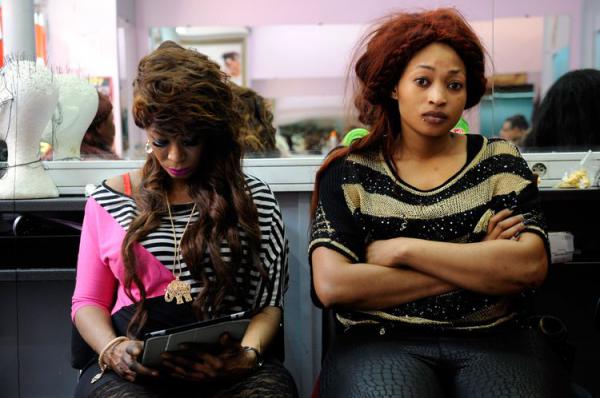
In Paris, this week 18 women and men, 14 of them undocumented immigrants, won an eight months battle for labor rights and human dignity. They are known as the workers of the “57” named after the address of the Afro Salon “New York fashion” 57 boulevard de Strasbourg in the heart of Paris.
They escaped their countries for various reasons. They are from Guinea, Ivory Coast, Guinea or China. Fatou left Ivory Coast because her life was threatened, she says that she wants to work and to pay her taxes to be part of the society. Alphonse from Burkina Faso had a visa to Turkey and then went to Greece where there was no work, and then came to Paris. He says that he had a lot of illusions, and then he saw how the bosses were merciless. His dream is to be finally happy. They each have a story rooted in intolerance and exploitation. They landed in Paris. Not all of them speak French. They all needed to work.
Many hair salons directed at migrant clients have settled in this district of Paris. Over time, a traffic involving the owners and managers targeted vulnerable and isolated migrants who needed work and dreamed about a safer more stable life. The managers recruited the workers of the 57 in the streets, enticing them with conditions of work and wages, which they never delivered. Instead, the workers had to work six days a week from 9AM to 11PM without interruption. The conditions were awful and harmful. The products they were asked to use contain carcinogenic agents, and they were used in rooms without ventilation increasing their toxicity. Their wages were extremely low from 300 to 400 Euros and irregularly paid.
Initially they had no work contracts. They first went on strike when they had not been paid in two months. Their bosses threatened to denounce them to the police, but they stood up for themselves. They reach out to the Union “CGT” for support after the managers and owners conveniently declared bankruptcy and disappeared, but not before shouting at them real threats against their lives. Their disappearance meant no possibility to regularize their immigration status.
As the general secretary of CGT Paris declared, this is modern slavery. They may not be physically shackled but the chains are now administrative and used by employers who exploit them. These chains are still heavy and violent. Still the techniques of slavery remained. The workers were separated according to language so they would not be able to communicate between each other.
But the workers responded with an extreme sense of solidarity. They endured threats. They disrupted the status quo with the authorities that allowed this worker trafficking to exist. Their courage and determination attracted attention. A group of film-makers made a little film to alert public opinion. Then, council members of the district and the deputy mayor of Paris multiplied the injunctions to the Minister of the Interior to obtain state protection, as required by law, for the workers. The union CGT pressed charges for human trafficking. Under French law, if an undocumented immigrant files an official complaint, the latter should receive a temporary residence permit. Regardless, the authorities were slow to move. While the workers were not going to be deported, their rights to work and to dignity were not restored. Artists mobilized and show their solidarity. Paris counselors of the leftist majority and the Mayor of Paris voted a text of support for the workers declaring that the non-protection of these employees will implicitly show support for these practices that imply exploitation of workers.
Finally, this week the Minister of the Interior regularized the 18 workers, providing then adequate documentation and the support of the state after eight months of hard struggle. Moreover, this victory is a good sign for many, especially those workers in this area who experience harsh conditions of life and work with abusive employers.
We should note that labor rights and laws to support them are being constantly questioned as human rights are again being defined according to origins and class. Their defense is crucial. At a time of merciless neoliberal control with climate and social destabilization, migration takes another dimension as asylum seekers are incarcerated or kept in unsafe situations threatening their lives. Cities like Paris should be involved in the protection of the most vulnerable residents and workers. Nothing is possible without strong solidarity between national, documented and undocumented humanity.
(Photo Credit: Africultures)